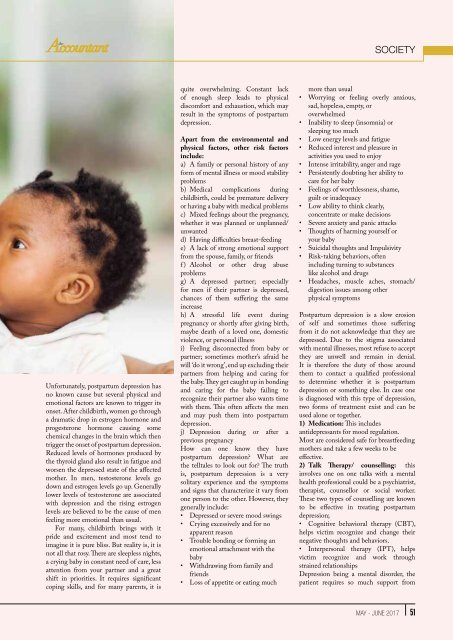The Accountant-May-June 2017
Create successful ePaper yourself
Turn your PDF publications into a flip-book with our unique Google optimized e-Paper software.
SOCIETY<br />
Unfortunately, postpartum depression has<br />
no known cause but several physical and<br />
emotional factors are known to trigger its<br />
onset. After childbirth, women go through<br />
a dramatic drop in estrogen hormone and<br />
progesterone hormone causing some<br />
chemical changes in the brain which then<br />
trigger the onset of postpartum depression.<br />
Reduced levels of hormones produced by<br />
the thyroid gland also result in fatigue and<br />
worsen the depressed state of the affected<br />
mother. In men, testosterone levels go<br />
down and estrogen levels go up. Generally<br />
lower levels of testosterone are associated<br />
with depression and the rising estrogen<br />
levels are believed to be the cause of men<br />
feeling more emotional than usual.<br />
For many, childbirth brings with it<br />
pride and excitement and most tend to<br />
imagine it is pure bliss. But reality is, it is<br />
not all that rosy. <strong>The</strong>re are sleepless nights,<br />
a crying baby in constant need of care, less<br />
attention from your partner and a great<br />
shift in priorities. It requires significant<br />
coping skills, and for many parents, it is<br />
quite overwhelming. Constant lack<br />
of enough sleep leads to physical<br />
discomfort and exhaustion, which may<br />
result in the symptoms of postpartum<br />
depression.<br />
Apart from the environmental and<br />
physical factors, other risk factors<br />
include:<br />
a) A family or personal history of any<br />
form of mental illness or mood stability<br />
problems<br />
b) Medical complications during<br />
childbirth, could be premature delivery<br />
or having a baby with medical problems<br />
c) Mixed feelings about the pregnancy,<br />
whether it was planned or unplanned/<br />
unwanted<br />
d) Having difficulties breast-feeding<br />
e) A lack of strong emotional support<br />
from the spouse, family, or friends<br />
f ) Alcohol or other drug abuse<br />
problems<br />
g) A depressed partner; especially<br />
for men if their partner is depressed,<br />
chances of them suffering the same<br />
increase<br />
h) A stressful life event during<br />
pregnancy or shortly after giving birth,<br />
maybe death of a loved one, domestic<br />
violence, or personal illness<br />
i) Feeling disconnected from baby or<br />
partner; sometimes mother’s afraid he<br />
will ‘do it wrong’, end up excluding their<br />
partners from helping and caring for<br />
the baby. <strong>The</strong>y get caught up in bonding<br />
and caring for the baby failing to<br />
recognize their partner also wants time<br />
with them. This often affects the men<br />
and may push them into postpartum<br />
depression.<br />
j) Depression during or after a<br />
previous pregnancy<br />
How can one know they have<br />
postpartum depression? What are<br />
the telltales to look out for? <strong>The</strong> truth<br />
is, postpartum depression is a very<br />
solitary experience and the symptoms<br />
and signs that characterize it vary from<br />
one person to the other. However, they<br />
generally include:<br />
• Depressed or severe mood swings<br />
• Crying excessively and for no<br />
apparent reason<br />
• Trouble bonding or forming an<br />
emotional attachment with the<br />
baby<br />
• Withdrawing from family and<br />
friends<br />
• Loss of appetite or eating much<br />
more than usual<br />
• Worrying or feeling overly anxious,<br />
sad, hopeless, empty, or<br />
overwhelmed<br />
• Inability to sleep (insomnia) or<br />
sleeping too much<br />
• Low energy levels and fatigue<br />
• Reduced interest and pleasure in<br />
activities you used to enjoy<br />
• Intense irritability, anger and rage<br />
• Persistently doubting her ability to<br />
care for her baby<br />
• Feelings of worthlessness, shame,<br />
guilt or inadequacy<br />
• Low ability to think clearly,<br />
concentrate or make decisions<br />
• Severe anxiety and panic attacks<br />
• Thoughts of harming yourself or<br />
your baby<br />
• Suicidal thoughts and Impulsivity<br />
• Risk-taking behaviors, often<br />
including turning to substances<br />
like alcohol and drugs<br />
• Headaches, muscle aches, stomach/<br />
digestion issues among other<br />
physical symptoms<br />
Postpartum depression is a slow erosion<br />
of self and sometimes those suffering<br />
from it do not acknowledge that they are<br />
depressed. Due to the stigma associated<br />
with mental illnesses, most refuse to accept<br />
they are unwell and remain in denial.<br />
It is therefore the duty of those around<br />
them to contact a qualified professional<br />
to determine whether it is postpartum<br />
depression or something else. In case one<br />
is diagnosed with this type of depression,<br />
two forms of treatment exist and can be<br />
used alone or together.<br />
1) Medication: This includes<br />
antidepressants for mood regulation.<br />
Most are considered safe for breastfeeding<br />
mothers and take a few weeks to be<br />
effective.<br />
2) Talk <strong>The</strong>rapy/ counselling: this<br />
involves one on one talks with a mental<br />
health professional could be a psychiatrist,<br />
therapist, counsellor or social worker.<br />
<strong>The</strong>se two types of counselling are known<br />
to be effective in treating postpartum<br />
depression;<br />
• Cognitive behavioral therapy (CBT),<br />
helps victim recognize and change their<br />
negative thoughts and behaviors.<br />
• Interpersonal therapy (IPT), helps<br />
victim recognize and work through<br />
strained relationships<br />
Depression being a mental disorder, the<br />
patient requires so much support from<br />
MAY - JUNE <strong>2017</strong> 51

















